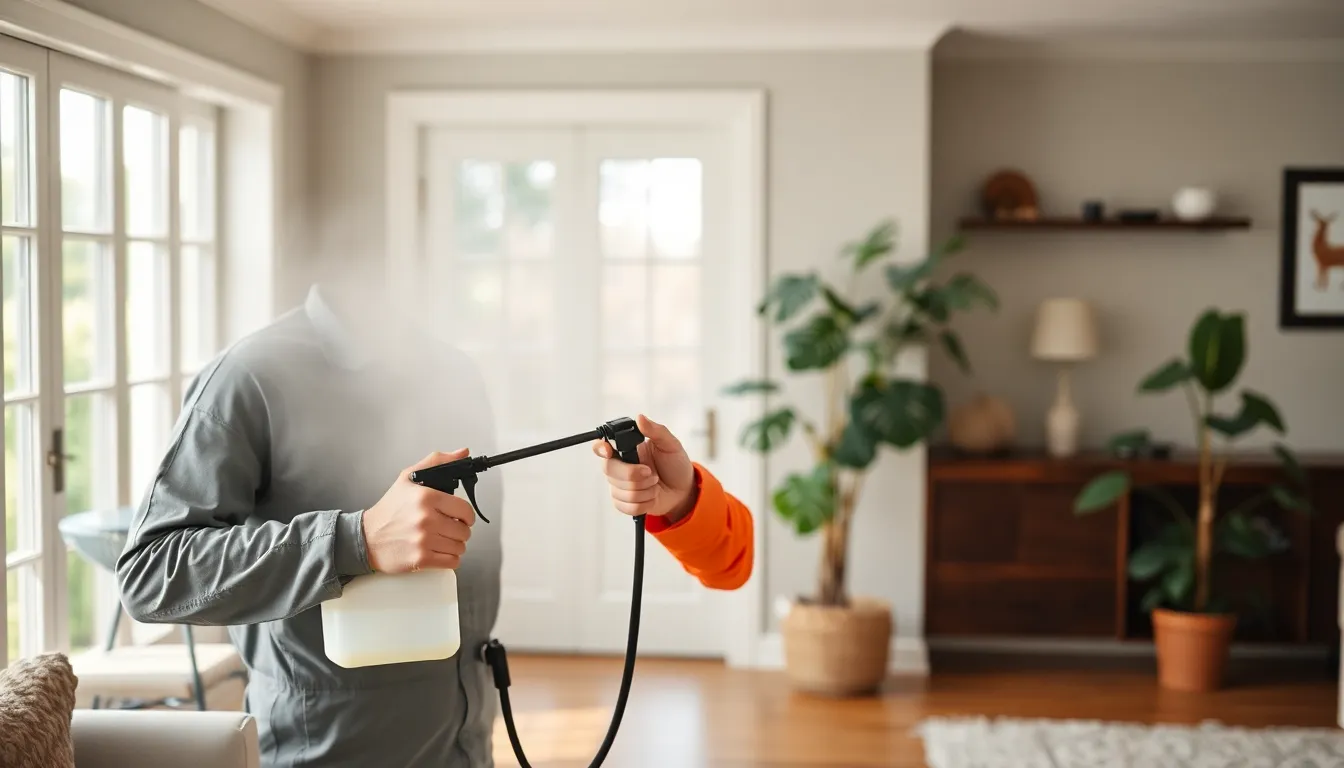Every homeowner knows the sinking feeling when a creepy crawly scuttles across the floor. It’s not just a nuisance; it’s a full-on invasion! Quality pest control isn’t just about getting rid of unwanted guests; it’s about reclaiming your space and peace of mind. Who wants to share their home with ants, roaches, or worse?
Table of Contents
ToggleWhat Is Quality Pest Control?
Quality pest control involves using effective methods to manage and eliminate pests while ensuring the safety and comfort of inhabitants. Professionals implement tailored strategies based on the specific types of pests involved and the unique circumstances of each property. This approach addresses immediate infestations and prevents future occurrences by integrating monitoring solutions with ongoing maintenance.
Integrated Pest Management (IPM) serves as a cornerstone of quality pest control. This method combines biological, mechanical, and chemical interventions, focusing on long-term prevention rather than just short-term fixes. For example, using traps and cultural controls enhances effectiveness while reducing reliance on pesticides.
Inspection plays a critical role in the quality pest control process. Experts thoroughly assess the property to identify pest harborage areas and entry points. This detailed evaluation informs targeted treatment plans, maximizing results and minimizing disruption.
Customer education constitutes another essential aspect of quality pest control. Companies provide guidance on reducing attractants and modifying behaviors that contribute to pest problems. By fostering awareness among homeowners, pest control companies empower them to maintain a pest-free environment.
In addition to efficacy, adhering to safety standards remains paramount. Quality pest control services prioritize using environmentally friendly products and techniques that pose minimal risks to humans and pets. This commitment ensures that interventions do not compromise the health and safety of residents.
Consistency in service is vital for achieving lasting results. Regular follow-ups, monitoring, and adjustments to treatment plans enhance the effectiveness of pest management strategies. Establishing a trusting relationship with a pest control provider creates peace of mind, knowing that one’s home remains protected against pest threats.
Importance of Quality Pest Control

Effective pest control significantly enhances living conditions. Prioritizing a pest-free environment contributes substantially to overall health and well-being.
Health Benefits
Pests can introduce harmful bacteria and allergens into homes. Rodents and insects transmit diseases that affect humans and pets alike. Quality pest control minimizes these health risks by eliminating infestations before they escalate. Regular treatments prevent exposure to diseases caused by pests such as Hantavirus and Salmonella. Homeowners often notice fewer allergy symptoms and respiratory issues when pests are successfully managed. A clean space without pests promotes mental well-being by reducing anxiety linked to infestations.
Environmental Considerations
Environmental health is paramount in quality pest control. Using Integrated Pest Management techniques leads to sustainable pest mitigation methods. These methods reduce reliance on harmful chemicals, safeguarding ecosystems and non-target species. Quality pest control companies often emphasize environmentally friendly products that minimize environmental impact. Safety for pets and wildlife is crucial; effective pest management addresses issues without damaging natural habitats. Long-term success hinges on balancing pest control efforts with ecological responsibility, ensuring a healthy home and environment coexist.
Key Principles of Quality Pest Control
Effective pest control focuses on more than just eliminating pests; it seeks to establish a long-term solution that emphasizes safety and environmental responsibility. A few core principles guide quality pest control practices.
Integrated Pest Management
Integrated Pest Management, or IPM, stands out as a vital strategy for pest control. This method incorporates a blend of biological, mechanical, and chemical solutions, making it comprehensive. Practitioners conduct thorough inspections to pinpoint pest problems and assess the environment. They also emphasize using eco-friendly products. Each step in the process reinforces the objective of minimizing pest populations while safeguarding human health and ecosystems. IPM allows for sustainable pest management that responds to specific pest issues.
Prevention and Monitoring
Preventative measures play a crucial role in maintaining a pest-free environment. Regular monitoring helps identify potential pest harborage areas before they become serious problems. Homeowners can adopt practices like sealing entry points and reducing clutter to deter pests. Routine inspections conducted by professionals ensure ongoing pest issues are detected early. By prioritizing these practices, homeowners maintain a safe, comfortable living space while supporting effective pest management and long-lasting results. Continuous monitoring helps keep infestations at bay, allowing everyone to enjoy a tranquil home.
Evaluating Quality Pest Control Services
Evaluating pest control services requires attention to several key factors. Prioritizing certification and licensing ensures that the company adheres to industry standards and regulations.
Certification and Licensing
Certification represents a commitment to professionalism in pest management. Quality pest control companies obtain licenses from state authorities, which reflect their compliance with safety protocols and best practices. Accreditation from recognized organizations indicates additional expertise and training. Checking for these certifications helps homeowners select reliable and knowledgeable providers. Furthermore, licensed professionals are often required to stay updated on the latest pest control techniques, ensuring effective service. A properly licensed company demonstrates accountability, contributing to peace of mind for clients.
Customer Reviews and Testimonials
Customer reviews serve as valuable insights into the effectiveness of pest control services. Reading testimonials provides a glimpse into past client experiences and service quality. Positive feedback highlights successful pest elimination strategies and customer satisfaction. Evaluating online ratings fosters informed decisions by comparing various companies in the area. Additionally, direct recommendations from friends or family can enhance trust in a particular service provider. Both written feedback and word-of-mouth referrals will guide homeowners toward reputable pest control options. Prioritizing these approvals ensures a more successful pest management experience.
DIY vs. Professional Pest Control
Homeowners often face the choice between DIY pest control and hiring professionals. DIY methods can be convenient and cost-effective. Many individuals prefer this approach for minor infestations or preventative measures. Common products include traps, sprays, and natural deterrents. However, effectiveness can vary significantly.
Professional pest control services offer tailored solutions for specific infestations. Trained specialists conduct thorough inspections to identify pest issues, providing insights into hidden problems. Companies utilize Integrated Pest Management (IPM), ensuring a combination of techniques that target the pest’s lifecycle comprehensively. Professionals often access stronger solutions and advanced equipment not available to the general public.
Cost considerations also play a role in decision-making. DIY options may initially seem less expensive, but they might necessitate repeated purchases of products and unsuccessful attempts. In contrast, investing in professional services typically means a one-time fee for effective, long-term results. Such investments often lead to fewer pest issues in the future, ultimately saving money.
Safety remains a paramount concern. DIY methods may include harmful chemicals that pose risks to humans and pets. In comparison, professional services prioritize safety by employing eco-friendly products and techniques. Compliance with safety regulations throughout the pest control process ensures a healthier living environment.
Furthermore, professionals provide maintenance plans, offering ongoing monitoring and support. Regular follow-ups can catch potential infestations early. Those who choose professionals may find peace of mind knowing that experts are managing their pest control needs effectively.
Weighing DIY against professional pest control involves assessing efficiency, safety, and the potential for long-term solutions. Prioritizing quality pest management leads to a comfortable and safe home environment.
Quality pest control is essential for maintaining a safe and comfortable home. By prioritizing effective strategies like Integrated Pest Management and utilizing eco-friendly products, homeowners can ensure lasting results while protecting their families and the environment. Regular inspections and professional assistance further enhance pest management efforts, allowing for early detection and tailored solutions.
Choosing licensed and reputable pest control services provides peace of mind and fosters a healthier living space. Homeowners should remain proactive in their pest prevention efforts by implementing best practices and seeking expert guidance. Ultimately, investing in quality pest control not only eliminates unwanted pests but also safeguards the well-being of all inhabitants.




